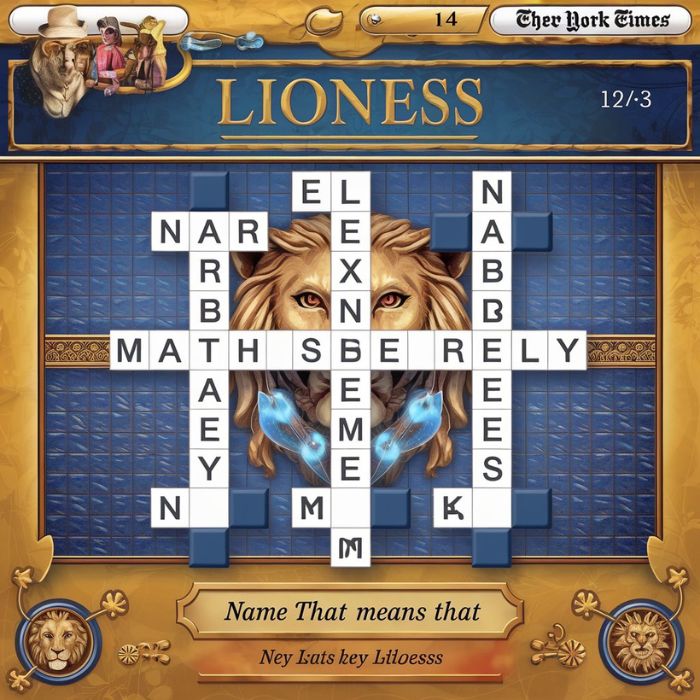Overview
The phenomenon of!
Crossword puzzles have long been a favorite pastime for word enthusiasts, challenging our minds and expanding our vocabularies. But lately, there’s been an intriguing twist in the New York Times Mini Puzzles: lioness names. These powerful female figures are making their mark on these beloved brain teasers, prompting players to dig deeper into their significance. Why lionesses? What do they represent? As we explore this phenomenon, we’ll uncover layers of meaning that give these puzzles newfound depth and complexity.
Join me as we roar through history, mythology, and personal anecdotes from crossword lovers who appreciate not just the challenge but also the cultural richness behind each clue. Whether you’re a seasoned puzzler or a curious newcomer, you’ll find something captivating about how lionesses are reshaping our understanding of wordplay in modern puzzles.
The history and significance of lionesses in different cultures and mythologies
Lionesses have held a powerful place in various cultures throughout history. In ancient Egypt, they symbolized strength and protection, often associated with the goddess Sekhmet. This fierce deity was depicted as a lioness and revered for her ability to ward off evil.
In African folklore, a name that means lioness Nyt Mini embodies nurturing qualities alongside their ferocity. They are seen as protectors of family and community, showcasing both power and grace. Their role emphasizes balance in nature—fierce hunters yet devoted caregivers.
Similarly, in Greek mythology, the Nemean Lion represented invincibility. The myth surrounding Heracles highlights not just courage but also the respect given to this formidable creature.
Across these narratives, lionesses inspire awe and reverence. Their duality reflects resilience—a theme that resonates deeply across cultures, reminding us of the strength inherent in femininity and leadership.
Analysis of specific
The choice of lioness names in NYT Mini Puzzles often reflects powerful female figures from history and mythology. Names like Sekhmet or Nemea evoke strength and valor. These references resonate with solvers, inviting them to explore deeper meanings.
Incorporating such names enriches the puzzle experience. It challenges players not just to solve problems but to think critically about the cultural implications behind each name.
Furthermore, these selections can spark curiosity. Solvers may find themselves searching for information about a particular figure after encountering her name in a grid. This exploration fosters learning beyond mere entertainment.
The inclusion of name that means lioness nyt mini creates connections between past narratives and present-day puzzles, reminding us of women’s historical roles as warriors and leaders throughout time. Each instance serves as a tribute to resilience while enhancing the thematic depth of crossword culture.
How these names add depth and complexity to crossword puzzles
Lioness names add a fascinating layer to crossword puzzles. They aren’t just words; they’re portals into history, culture, and power.
When a puzzle features a lioness name, it sparks curiosity. It invites solvers to explore the stories behind these figures. Perhaps they reflect strength or maternal instincts that resonate across generations.
These names also challenge traditional norms in puzzle construction. Instead of relying solely on generic answers, constructors can weave rich narratives into their grids. This transforms each solution into an enlightening experience.
Moreover, incorporating diverse lioness names highlights underrepresented voices in literature and mythology. It enriches the tapestry of crosswords by celebrating women who have roared throughout history.
This depth not only enhances gameplay but also engages solvers on multiple levels—intellectually and emotionally—and fosters appreciation for cultural richness in language games.
Interviews with crossword enthusiasts and constructors on their thoughts about
In chatting with crossword enthusiasts, a common thread emerges. Many express excitement about the inclusion of lioness names in puzzles. They appreciate how these names elevate the theme and encourage players to think outside the box.
Constructors share their motivations too. One noted that using powerful female figures like lionesses challenges stereotypes within puzzle creation. It sparks curiosity and conversation among solvers.
Another enthusiast mentioned how encountering these names often leads to deeper learning about different cultures. It’s not just a game; it’s an opportunity for exploration and growth.
The discussions reveal a desire for broader representation in crosswords. Both constructors and fans want puzzles that reflect diverse experiences, making each puzzle richer than before. This commitment to inclusivity fosters community engagement, drawing more people into the world of wordplay.
The impact of diversity and inclusivity in puzzle
The world of crossword puzzles is continually evolving. As the New York Times Mini Puzzles embrace names like “name that means lioness nyt mini,” they reflect a broader cultural shift towards diversity and inclusivity. This change enriches not just the puzzles themselves but also the experience for solvers.
Diverse names bring fresh perspectives into play. They challenge traditional narratives, inviting players to explore new stories and histories often overlooked in mainstream media. Incorporating lioness names serves as a reminder of women’s strength, courage, and leadership throughout different cultures.
Puzzle enthusiasts have shared how these diverse elements enhance their solving experience. One enthusiast noted that encountering varied references creates an opportunity for learning—something that transcends mere entertainment. It transforms each puzzle into a mini-educational journey.
Constructors are increasingly aware of this impact too. By prioritizing representation in their clues and answers, they foster an environment where everyone feels seen and acknowledged. This approach encourages more people to engage with crosswords who may have previously felt excluded from such activities.
As we continue to see this evolution unfold, it’s clear that embracing diversity leads to richer experiences all around—both on paper and off it.











